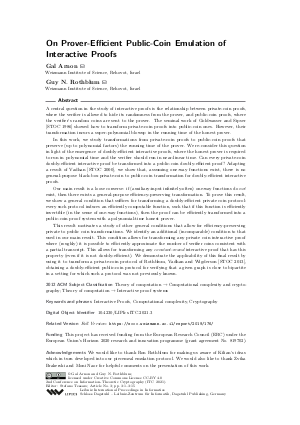@InProceedings{arnon_et_al:LIPIcs.ITC.2021.3,
author = {Arnon, Gal and Rothblum, Guy N.},
title = {{On Prover-Efficient Public-Coin Emulation of Interactive Proofs}},
booktitle = {2nd Conference on Information-Theoretic Cryptography (ITC 2021)},
pages = {3:1--3:15},
series = {Leibniz International Proceedings in Informatics (LIPIcs)},
ISBN = {978-3-95977-197-9},
ISSN = {1868-8969},
year = {2021},
volume = {199},
editor = {Tessaro, Stefano},
publisher = {Schloss Dagstuhl -- Leibniz-Zentrum f{\"u}r Informatik},
address = {Dagstuhl, Germany},
URL = {https://drops.dagstuhl.de/entities/document/10.4230/LIPIcs.ITC.2021.3},
URN = {urn:nbn:de:0030-drops-143226},
doi = {10.4230/LIPIcs.ITC.2021.3},
annote = {Keywords: Interactive Proofs, Computational complexity, Cryptography}
}

 Creative Commons Attribution 4.0 International license
Creative Commons Attribution 4.0 International license

